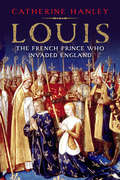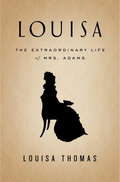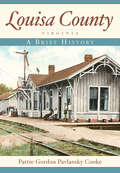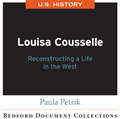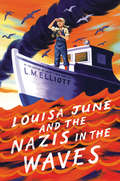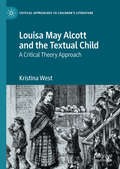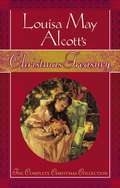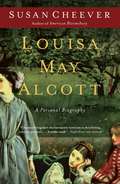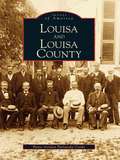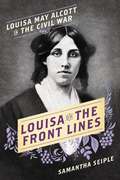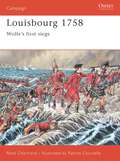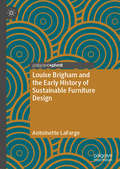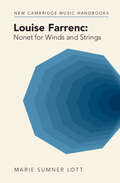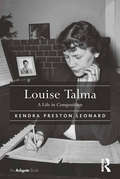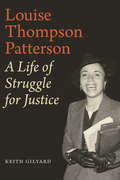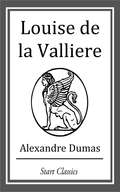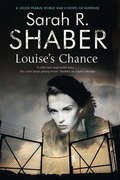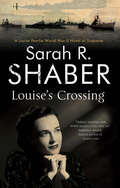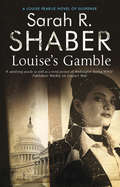- Table View
- List View
Louis: The French Prince Who Invaded England
by Catherine HanleyIn 1215 a group of English barons, dissatisfied with the weak and despicable King John, decided that they needed a new monarch. They wanted a strong, experienced man, of royal blood, and they found him on the other side of the Channel: astonishingly, the most attractive candidate for the crown of England was Louis, eldest son and heir of the king of France. In this fascinating biography of England's least-known "king"--and the first to be written in English--Catherine Hanley explores the life and times of "Louis the Lion" before, during, and beyond his quest for the English throne. She illuminates the national and international context of his 1216 invasion, and explains why and how after sixteen fruitless months he failed to make himself King Louis I of England. Hanley also explores Louis's subsequent reign over France until his untimely death on the Albigensian Crusade. Published eight centuries after the creation of Magna Carta and on the 800th anniversary of Louis's proclamation as king, this fascinating story is a colorful tale of national culture, power, and politics that brings a long-forgotten life out of the shadows of history.
Louisa
by Louisa ThomasAn intimate portrait of Louisa Catherine Adams, the wife of John Quincy Adams, who witnessed firsthand the greatest transformations of her time Born in London to an American father and a British mother on the eve of the Revolutionary War, Louisa Catherine Johnson was raised in circumstances very different from the New England upbringing of the future president John Quincy Adams, whose life had been dedicated to public service from the earliest age. And yet John Quincy fell in love with her, almost despite himself. Their often tempestuous but deeply close marriage lasted half a century. They lived in Prussia, Massachusetts, Washington, Russia, and England, at royal courts, on farms, in cities, and in the White House. Louisa saw more of Europe and America than nearly any other woman of her time. But wherever she lived, she was always pressing her nose against the glass, not quite sure whether she was looking in or out. The other members of the Adams family could take their identity for granted--they were Adamses; they were Americans--but she had to invent her own. The story of Louisa Catherine Adams is one of a woman who forged a sense of self. As the country her husband led found its place in the world, she found a voice. That voice resonates still. In this deeply felt biography, the talented journalist and historian Louisa Thomas finally gives Louisa Catherine Adams's full extraordinary life its due. An intimate portrait of a remarkable woman, a complicated marriage, and a pivotal historical moment, Louisa Thomas's biography is a masterful work from an elegant storyteller.From the Hardcover edition.
Louisa Catherine: The Other Mrs. Adams
by Margery M. Heffron&“Spiced with sexual mischief, political conflict and family tragedy . . . Her biography is nothing less than captivating, an engrossing read.&”—Pittsburgh Post-Gazette Louisa Catherine Johnson Adams, wife and political partner of John Quincy Adams, became one of the most widely known women in America when her husband assumed office as sixth president in 1825. Shrewd, intellectual, and articulate, she was close to the center of American power over many decades, and extensive archives reveal her as an unparalleled observer of the politics, personalities, and issues of her day. Louisa left behind a trove of journals, essays, letters, and other writings, yet no biographer has mined these riches until now. Margery Heffron brings Louisa out of the shadows at last to offer the first full and nuanced portrait of an extraordinary first lady. The book begins with Louisa&’s early life in London and Nantes, France, then details her excruciatingly awkward courtship and engagement to John Quincy, her famous diplomatic success in tsarist Russia, her life as a mother, years abroad as the wife of a distinguished diplomat, and finally the Washington, D.C., era when, as a legendary hostess, she made no small contribution to her husband&’s successful bid for the White House. Louisa&’s sharp insights as a tireless recorder provide a fresh view of early American democratic society, presidential politics and elections, and indeed every important political and social issue of her time. &“[A] sparkling biography . . . [A] fascinating, if partial, portrait of an exceptional woman.&”—The New York Times Book Review (cover review) &“Superb . . . Heffron is a spirited, elegant writer.&”—Open Letters Monthly
Louisa County, Virginia: A Brief History
by Pattie Gordon CookeSet amidst lush, rolling hills, Louisa County was once home to religious dissenters, emancipationists and some ofVirginia's first families. Its epicenter was Louisa Courthouse, where all the county's residents managed their business affairs. From Patrick Henry's seminal speech forLouisa against tyranny, to a county chief justice too fat to ride horseback, Louisa has a rich and fascinating heritage.Historian and longtime Louisa County resident Pattie G.P. Cooke chronicles the county's coming of age as part of the new United States of America, retaining its small, tightly knit communities while embracing inevitable progress.
Louisa Cousselle: Reconstructing a Life in the West
by Paula PetrikHistorians know that often primary source evidence is neither neat nor complete. This unit introduces you to a range of primary sources centered on the life of a nineteenth-century prostitute in the American West. Like a historian, you will use these limited sources to create a plausible account of Louisa Cousselle’s life — and, by extension, the lives of other western prostitutes. You will learn to identify evidentiary gaps and employ strategies (verification, inference, reasonable speculation) for dealing with the missing pieces.
Louisa June and the Nazis in the Waves
by L. M. ElliottIn this moving and timeless story, award-winning author L. M. Elliott captures life on the U.S. homefront during World War II, weaving a rich portrait of a family reeling from loss and the chilling yet hopeful voyage of fighting for what matters, perfect for fans of The War That Saved My Life. Days after Japan’s attack on Pearl Harbor in 1941, Hitler declared war on the U.S., unleashing U-boat submarines to attack American ships. Suddenly, the waves outside Louisa June’s farm aren’t for eel-fishing or marveling at wild swans or learning to skull her family’s boat—they’re dangerous, swarming with hidden enemies.Her oldest brothers’ ships risk coming face-to-face with U-boats. Her sister leaves home to weld Liberty Boat hulls. And then her daddy, a tugboat captain, and her dearest brother, Butler, are caught in the crossfire. Her mama has always swum in a sea of melancholy, but now she really needs Louisa June to find moments of beauty or inspiration to buoy her. Like sunshine-yellow daffodils, good books, or news accounts of daring rescues of torpedoed passengers.Determined to help her Mama and aching to combat Nazis herself, Louisa June turns to her quirky friend Emmett and the indomitable Cousin Belle, who has her own war stories—and a herd of cats—to share. In the end, after a perilous sail, Louisa June learns the greatest lifeline is love.
Louisa May Alcott and the Textual Child: A Critical Theory Approach (Critical Approaches to Children's Literature)
by Kristina WestThis book examines constructions of childhood in the works of Louisa May Alcott. While Little Women continues to gain popular and critical attention, Alcott’s wider works for children have largely been consigned to history. This book therefore investigates Alcott’s lesser-known children’s texts to reconsider critical assumptions about childhood in her works and in literature more widely. Kristina West investigates the trend towards reading Alcott’s life into her works; readings of gender and sexuality, race, disability, and class; the sentimental domestic; portrayals of Transcendentalism and American education; and adaptations of these works. Analyzing Alcott as a writer for twenty-first-century children, West considers Alcott’s place in the children’s canon and how new media and fan fiction impact readings of her works today.
Louisa May Alcott's Christmas Treasury: The Complete Christmas Collection
by Louisa May Alcott Stephen W. HinesChristmas is the season to rekindle faith, hope, and love. It is a time to enjoy friends and family, to sing carols, to give gifts. All of these joyous and evocative sentiments of the Christmas season are beautifully expressed in the life and writings of Louisa May Alcott. Now for the first time, all of Alcott's Christmas short stories and novellas--some lost to the world of publishing for nearly a century--have been gathered into a single exquisite collection, which is sure to brighten the holidays for book lovers. So slip away to a quiet nook away from the hustle and bustle of the season, cozy up with your cup of hot tea or cocoa, and prepare to have your heart warmed as you are inspired by the unforgettable characters you are about to meet in the nineteen enchanting stories of this delightful treasury.
Louisa May Alcott: A Personal Biography (Library Of America Louisa May Alcott Edition Ser. #2)
by Susan CheeverLouisa May Alcott never intended to write Little Women. She had dismissed her publisher's pleas for such a novel. Written out of necessity to support her family, the book had an astounding success that changed her life, a life which turned out very differently from that of her beloved heroine Jo March. In Louisa May Alcott, Susan Cheever, the acclaimed author of American Bloomsbury, returns to Concord, Massachusetts, to explore the life of one of its most iconic residents. Based on extensive research, journals, and correspondence, Cheever's biography chronicles all aspects of Alcott's life, from the fateful meeting of her parents to her death, just two days after that of her father. She details Bronson Alcott's stalwart educational vision, which led the Alcotts to relocate each time his progressive teaching went sour; her unsuccessful early attempts at serious literature, including Moods, which Henry James panned; her time as a Civil War nurse, when she contracted pneumonia and was treated with mercury-laden calomel, which would affect her health for the rest of her life; and her vibrant intellectual circle of writers and reformers, idealists who led the charge in support of antislavery, temperance, and women's rights. Alcott's independence defied the conventional wisdom, and her personal choices and literary legacy continue to inspire generations of women. A fan of Little Women from the age of twelve, and a distinguished author in her own right, Cheever brings a unique perspective to Louisa May Alcott's life as a woman, a daughter, and a working writer.
Louisa and Louisa County (Images of America)
by Pattie Gordon CookeFilled with local stories and anecdotes and containing an impressive range of photographs-from snapshots of veterans of the War Between the States to high school class pictures from the 1950s; from early images of the resort area to photographs documenting recent changes to Louisa-this new book will earn a lasting place on area bookshelves and will be handed down from generation to generation for years to come. Louisa and Louisa County will be enjoyed by older folk as a trip down memory lane, and appreciated by younger generations as a glimpse of an era when life was harder, but perhaps simpler. Also a valuable source of information for newcomers to the area, this powerful work serves to remind us of the importance of understanding our past and preserving our heritage in our march toward the twenty-first century.
Louisa on the Front Lines: Louisa May Alcott in the Civil War
by Samantha SeipleAn eye-opening look at Little Women author Louisa May Alcott's time as a Civil War nurse, and the far-reaching implications her service had on her writing and her activism Louisa on the Frontlines is the first narrative nonfiction book focusing on the least-known aspect of Louisa May Alcott's career - her time spent as a nurse during the Civil War. Though her service was brief, the dramatic experience was one that she considered pivotal in helping her write the beloved classic Little Women. It also deeply affected her tenuous relationship with her father, and inspired her commitment to abolitionism. Through it all, she kept a journal and wrote letters to her family and friends. These letters were published in the newspaper, and her subsequent book, Hospital Sketches spotlighted the dire conditions of the military hospitals and the suffering endured by the wounded soldiers she cared for. To this day, her work is considered a pioneering account of military nursing. Alcott's time as an Army nurse in the Civil War helped her find her authentic voice--and cemented her foundational belief system. Louisa on the Frontlines reveals the emergence of this prominent feminist and abolitionist--a woman whose life and work has inspired millions and continues to do so today,
Louisbourg 1758
by Rene Chartrand Patrice CourcelleOsprey's study of James Wolfe's siege of Louisbourg during the French and Indian War (1754-1763). Louisbourg represented a major threat to Anglo-American plans to invade Canada. Bypassing it would leave an immensely powerful enemy base astride the Anglo-American lines of communication - Louisbourg had to be taken. Faced with strong beach defences and rough weather, it took six days to land the troops, and it was only due to a stroke of daring on the part of a young brigadier named James Wolfe, who managed to turn the French beach position, that this was achieved. The story is largely based on firsthand accounts from the journals of several participants, including French Governor Drucour's, whose excellent account has never been published.
Louise Brigham and the Early History of Sustainable Furniture Design
by Antoinette LaFargeDuring the Progressive Era, a time when the field of design was dominated almost entirely by men, a largely forgotten activist and teacher named Louise Brigham became a pioneer of sustainable furniture design. With her ingenious system for building inexpensive but sturdy “box furniture” out of recycled materials, she aimed to bring good design to the urban working class. As Antoinette LaFarge shows, Brigham forged a singular career for herself that embraced working in the American and European settlement movements, publishing a book of box furniture designs, running carpentry workshops in New York, and founding a company that offered some of the earliest ready-to-assemble furniture in the United States. Her work was a resounding critique of capitalism’s waste and an assertion of new values in design—values that stand at the heart of today’s open and green design movements.
Louise Farrenc: Nonet for Winds and Strings (New Cambridge Music Handbooks)
by Marie Sumner LottAs well as being a virtuoso pianist, Louise Farrenc became the first woman to hold a permanent position as Professor at the Paris Conservatoire while continuing to compose symphonic and chamber music. This handbook introduces readers to Farrenc and her contemporaries with a focus on professional women musicians in nineteenth-century Paris. Farrenc's music was much admired by her contemporaries including Robert Schumann and Hector Berlioz. The acclaimed Nonet (1849) incorporated playful dialogue within the ensemble, virtuosic display, and an artful balance of newer and older compositional methods, garnering critical and artistic success and official recognition for the composer. Its performance history shows how musicians managed the logistics of professional life: forming and sustaining relationships, organizing concerts and tours, and promoting their work in the musical press. The book's nuanced analytical approach and historical insights will allow students, performers and listeners a fresh appreciation of Farrenc's work.
Louise Talma: A Life in Composition (Cms Monographs And Sourcebooks In American Music Ser.)
by Kendra Preston LeonardAmerican composer Louise Talma (1906-1996) was the first female winner of two back-to-back Guggenheim Awards (1946, 1947), the first American woman to have an opera premiered in Europe (1962), the first female winner of the Sibelius Award for Composition (1963), and the first woman composer elected to the American Academy and Institute of Arts and Letters (1974). This book analyses Talma’s works in the context of her life, focusing on the effects on her work of two major changes she made during her adult life: her conversion to Catholicism as an adult, under the guidance of Nadia Boulanger, and her adoption of serial compositional techniques. Employing approaches from traditional musical analysis, feminist and queer musicology, and women’s autobiographical theory to examine Talma’s body of works, comprising some eighty pieces, this is the first full-length study of this pioneering composer. Exploring Talma’s compositional language, text-setting practices, and the incorporation of autobiographical elements into her works using her own letters, sketches, and scores, as well as a number of other relevant documents, this book positions Talma’s contributions to serial and atonal music in the United States, considers her role as a woman composer during the twentieth century, and evaluates the legacy of her works and career in American music.
Louise Thompson Patterson: A Life of Struggle for Justice
by Keith GilyardBorn in 1901, Louise Thompson Patterson was a leading and transformative figure in radical African American politics. Throughout most of the twentieth century she embodied a dedicated resistance to racial, economic, and gender exploitation. In this, the first biography of Patterson, Keith Gilyard tells her compelling story, from her childhood on the West Coast, where she suffered isolation and persecution, to her participation in the Harlem Renaissance and beyond. In the 1930s and 1940s she became central, along with Paul Robeson, to the labor movement, and later, in the 1950s, she steered proto-black-feminist activities. Patterson was also crucial to the efforts in the 1970s to free political prisoners, most notably Angela Davis. In the 1980s and 1990s she continued to work as a progressive activist and public intellectual. To read her story is to witness the courage, sacrifice, vision, and discipline of someone who spent decades working to achieve justice and liberation for all.
Louise de la Valliere
by Alexandre DumasThe final volume of D'Artagnan Romances: it is usually split into four parts, The Vicomte de Bragelonne, Ten Years Later, Louise de la Valliere, and the final portion is entitled The Man in the Iron Mask.
Louise's Blunder: A 1940s Spy Thriller Set In Wartime Washington (The Louise Pearlie World War II Novels of Suspense #4)
by Sarah R. ShaberGovernment girl Louise is blackmailed into investigating the suspicious death of a missing co-worker, with sinister consequences. 1940s Washington, DC, government girl Louise Pearlie is asked to review the file usage of a missing analyst from the Office of Strategic Services—the US wartime intelligence agency—only to learn he&’d drowned in the Tidal Basin days before. OSS confirm it was an accident, and Louise is sent back to her regular job in the file rooms. Her time spent investigating Paul Hughes at least has one positive outcome, though: Louise meets a young woman in the OSS Reading Room, who asks her to join her &“salon,&” where she is encouraged to talk about controversial issues like racial segregation and equal pay for women. Socializing with the women helps her cope with her beau Joe Prager&’s transfer to New York City. But Louise&’s life soon takes a dangerous and sinister turn, and she can&’t help but worry if she&’ll wind up floating in the Tidal Basin herself . . . &“A solid and suspenseful story . . . This series keeps getting better.&” —Booklist
Louise's Chance: A 1940s Spy Thriller Set In Wartime Washington (The Louise Pearlie World War II Novels of Suspense #5)
by Sarah R. ShaberGovernment girl Louise gets her big chance, when she is tasked with recruiting German POWs for a secret mission inside Nazi Germany. 1940s Washington, DC, government girl Louise Pearlie has a new job inside the OSS—the Office of Strategic Services: recruiting German prisoners-of-war for a secret mission inside Nazi Germany. It&’s a big chance for her, and Louise hopes she can finally escape her filing and typing duties. With the job comes two new colleagues: Alice Osborne, a propaganda expert, and Merle Ellison, a forger from Texas who just happens to speak fluent German. But when the three arrive at Fort Meade camp, to interview the first German POWs to arrive there, their mission is beset by complications. Only one of the prisoners speaks English, the army officer in charge of the camp is an alcoholic and two prisoners disappeared on the ship bringing the Germans to the states. Were their deaths suicide? Officially, yes. But Louise can&’t help but have her doubts . . . &“A fine example of the historical mystery . . . The whodunit is well-crafted, with enough red herrings to keep readers guessing.&” —Star News Online &“As usual, Shaber provides interesting period details&” —Publishers Weekly
Louise's Crossing (The Louise Pearlie World War II Novels of Suspense #7)
by Sarah R. ShaberGovernment girl Louise Pearlie is thrilled to be posted to London, but her journey across the Atlantic proves to be anything but plain sailing…February, 1944. Washington D.C. With the war entering its most dangerous phase, Louise Pearlie is thrilled to be reassigned to the London office of the OSS. But in order to take up her new post, she must make a perilous crossing of the Atlantic Ocean in the SS Amelia Earhart. Accompanying her on the voyage to Liverpool are an eclectic group of passengers, including the aloof Blanche Bryant, whose husband, Eddie, died in mysterious circumstances on the ship’s voyage out to New York three months before. Most of the same crew and passengers are on the return voyage, and one question remains: was it really suicide? When the body of one of the passengers is found on deck, it’s clear that German bombs and raging storms aren’t the only threats to Louise’s safety. Can she expose a brutal killer before the ship docks in England?
Louise's Dilemma (The Louise Pearlie World War II Novels of Suspense #3)
by Sarah R. ShaberThe third book in the Louise Pearlie Mysteries is &“an entertaining combination of mystery, adventure, and romance, with a great sense of place and time&” (Historical Novel Society). Young widow Louise Pearlie seizes a chance to escape the typewriters and files of the Office of Strategic Services, the United States&’ World War II spy agency, when she&’s asked to investigate a puzzling postcard referred to OSS by the US Censor. She and FBI agent Gray Williams head off to St. Leonard, Maryland, to talk to the postcard&’s recipient, one Leroy Martin. But what seemed like a straightforward mission to Louise soon becomes complicated. Leroy and his wife, Anne, refuse to talk, but as Louise and Williams investigate, it soon becomes clear that Leroy is mixed up in something that looks a lot like treason. But what? Louise is determined to find out the truth, whatever the cost . . . &“A very good entry in this new and promising series.&” —Booklist
Louise's Gamble (The Louise Pearlie World War II Novels of Suspense #2)
by Sarah R. ShaberYoung widow Louise Pearlie becomes embroiled in a perilous game of mafia bosses, Nazi spies, and banished royalty in this wartime novel of suspense. It&’s 1942 in Washington, DC. Louise Pearlie is now a chief file clerk at the legendary Office of Strategic Services, the precursor to the CIA, and enjoying being an independent, working woman despite wartime privations. But a casual friendship struck up with Alessa di Luca, a secretive war refugee, sucks Louise into a dangerous game of mafia bosses, Nazi spies, banished royalty, and Sicilian aristocracy—placing not only her job, but her life, in jeopardy . . . &“Shaber brews a delightful mix of feminine wiles and real-life history that will keep readers turning the pages.&” —Publishers Weekly &“Shaber has created a wonderful cast of characters . . . A wonderfully entertaining read.&” —Historical Novel Society
Louise's Lies: A 1940s Spy Thriller Set In Wartime Washington D. C. (The Louise Pearlie World War II Novels of Suspense #6)
by Sarah R. Shaber&“Shaber&’s winning sixth WWII mystery is her best yet&”—from the award-winning author of Louise&’s Chance and Louise&’s Crossing (Publishers Weekly, starred review). When a body is discovered in a Washington bar, government girl Louise Pearlie is forced into a role of lies and deception. On a bitterly cold night in December 1943, Louise Pearlie and her friend Joe Prager are enjoying a quiet drink in the Baron Steuben Inn when a bloodstained body is discovered behind the bar. Although the victim had been a regular customer, no one seems to know anything about him. When it turns out there is a link to Louise&’s top-secret work at the OSS, she is ordered to find out as much as possible about the murder while keeping the connection secret from those involved, including the investigating police detective. Although Louise has been trained to keep secrets, the constant deception is taking its toll—especially when she discovers that she&’s not the only customer at the Steuben that night with something to hide. Will Louise&’s silence result in an innocent man being arrested for murder? &“[Louise&’s] sixth adventure is a worthy addition to the franchise.&”—Kirkus Reviews &“Shaber does a fine job portraying the plight of alien residents in wartime Washington, besides conveying the hectic atmosphere of a city whose resources are stretched to the limit by an influx of new workers.&”—Publishers Weekly (starred review)
Louise's War (The Louise Pearlie World War II Novels of Suspense #1)
by Sarah R. ShaberThe first book in the Louise Pearlie Mysteries is &“Sarah Shaber&’s best novel yet&” (Margaret Maron). It&’s 1942. Louise Pearlie, a young widow, has come to Washington, DC to work for the legendary Office of Strategic Services, the precursor to the CIA. When she discovers a document concerning the husband of her college friend Rachel Bloch—a young French Jewish woman she is desperately worried about—Louise realizes she may be able to help Rachel escape from Vichy France. But then a colleague whose help Louise has enlisted is murdered, and she realizes she is on her own, unable to trust anyone . . . &“A satisfying puzzle as well as a vivid picture of Washington during WWII.&” —Publishers Weekly &“An auspicious debut.&” —Library Journal
